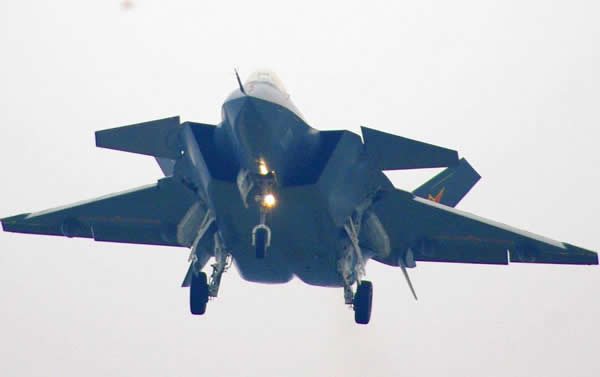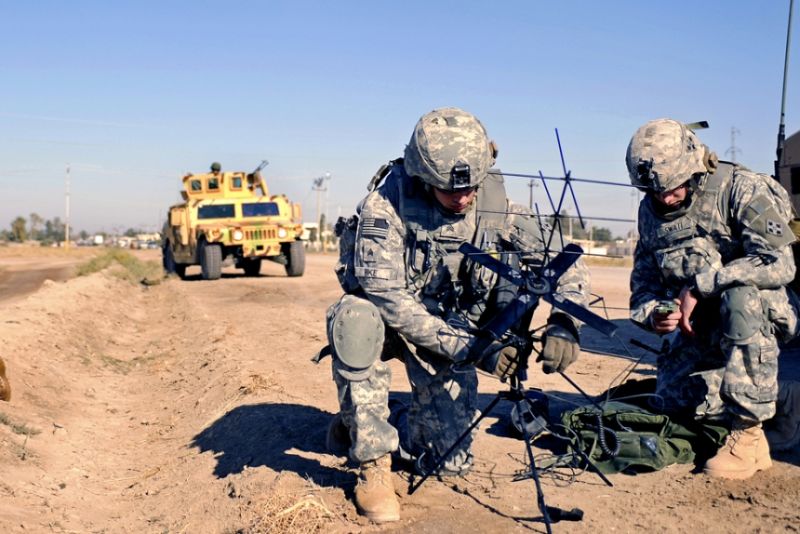Iran over the weekend presented what it called a “significant achievement in the field of aerospace technology” — a domestically built fighter jet with stealth capabilities.
Some aviation experts, however, believe the tiny, angular fighter jet with stubby wings shown to the world may have been an expensive mock-up and that video footage of the black jet screaming across the sky may actually show a radio-controlled model aircraft instead.
Such skepticism may be understandable, given the recent questions surrounding Iran’s now-dubious claim of having sent a monkey into space and returning him safely to Earth.
At an unveiling ceremony in a Tehran warehouse on February 2, Iranian President Mahmud Ahmadinejad said that now “the speed of Iran’s development in science and technology does not depend on circumstances, it depends on our will.” He assured the world that the Qaher (Conqueror) F-313 project “carries the message of brotherhood, peace, and security and it doesn’t pose any threat to anyone. There is no intention to interfere in any other country’s affairs.”
He also said the “deterrent” aircraft, built by the country’s Aviation Industries Organization, had been test-flown for “thousands of hours” and that Iranian pilots were “very satisfied with its performance.”
“We should set higher targets,” Ahmadinejad said. “We see that it is possible. We have the capabilities.”
Defense Minister Ahmad Vahidi described the jet as having “unique physical characteristics,” of being made of “advanced materials,” and said that it boasted a very low radar cross section that enables it to operate at low altitudes. He also said it can take off and land on short runways and can carry advanced, domestically manufactured weapons.
Considering that Iran is operating under an international arms embargo and that spare parts for its aging fleet of domestic commercial aircraft and air force jets (some Russian-made and others being U.S. jets acquired before Iran’s 1979 Islamic Revolution) are difficult to obtain, experts and analysts are calling into question the veracity of Tehran’s claims.
“The Aviationist” website, run by former Italian Air Force pilot and freelance aviation journalist David Cenciotti, calls the Qaher F-313 a “really peculiar design,” with “odd” canopy material and a tiny nose section where it would be difficult to house radar:
The cockpit seems to be basic (a bit too much for a modern plane – note the lack of wirings behind the front panel and the presence of few instruments, some of those similar to those equipping small private planes…).
The air intakes are extremely small (they remind those of current drones/unmanned combat aerial vehicles) whereas the engine section lacks any kind of nozzle: engine afterburners could melt the entire jet.
Cenciotti concludes that the photograph released by Iran is “nothing more than a large mock-up model” and that the video more closely resembles a “radio-controlled scale model more than a modern fighter jet.”
He notes that the Iranian footage, revealingly, does not show the plane taking off or landing.
The Israeli newspaper “Maariv” quotes Israeli aeronautics expert Tal Inbar as saying the fighter jet looks like a fiberglass or cardboard model:
“It’s not a plane, because that’s not how a real plane looks. Iran doesn’t have the ability to build planes. Plain and simple.”
The Times of Israel, however, quotes an Israeli aerospace engineer on condition of anonymity as saying that, while the plane on display was “clearly not” a working prototype…
“…it integrated advanced stealth design with extreme maneuverability. He said that while the Qaher’s design lacked bombing capability, it had the potential to be an effective interceptor capable of defending Iran’s skies from aerial threats.
“They need a defensive interceptor that gives them the element of surprise, and it is big enough to carry real air-to-air missiles,” he said.
Another aviation and defense writer, Dave Majumdar of the The DEW Line blog, says the aircraft on display in Tehran more closely resembles an old G.I. Joe toy than a modern stealth-capable aircraft.
The Iranians would have you believe this is some sort of highly advanced stealth strike aircraft that they’ve already designed, built and flown. But this, frankly speaking, looks unimpressive — and if I had to put money down on it, I say it’s a mock-up. I suppose it could be some sort of test bed, but I’m highly skeptical.
He questions almost every aspect of the jet, noting that if this is, indeed, supposed to be a combat aircraft, there can’t be much room for fuel, let alone weapons onboard. He says the cockpit appears unfinished and that the canopy seems to be made of poor-quality Plexiglas “with some really bad optical qualities.” He even questions whether there’s actually an engine installed.
“Time will tell if this is a serious development or not,” Majumdar concludes. “I suspect not, but we’ll see.”











